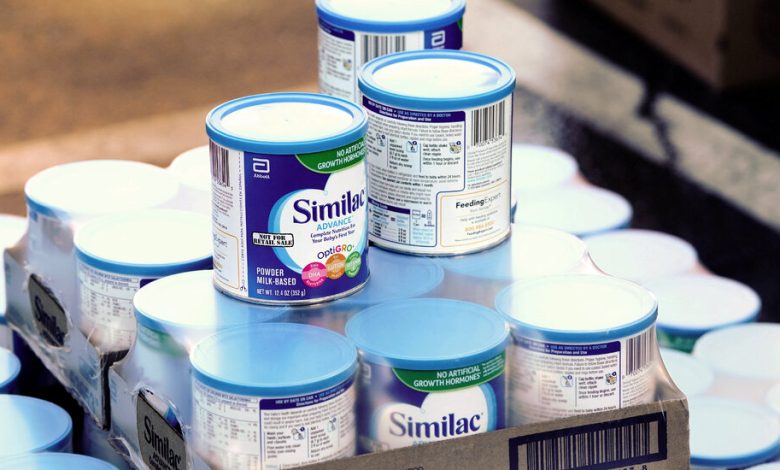How Abbott Kept Sick Babies From Becoming a Scandal

Early on a Saturday morning in 2013, Mark Bennett, a federal judge, walked into his chambers in the courthouse in Sioux City, Iowa. He’d been out of town for a speaking engagement and was hoping to catch up on work. A surprise awaited him as he entered his office: Cardboard boxes were stacked everywhere. His immediate thought was that another judge might be moving in.
Another judge was not moving in. Judge Bennett was presiding over a case in which Abbott Laboratories, the sprawling health care company that dominated the market for infant formula, was being sued on behalf of a girl, Jeanine Kunkel, who five years earlier had suffered severe brain damage after consuming the company’s powdered formula. Jeanine couldn’t speak, sit up or even swallow, and the tragedy had nearly destroyed her family.
The boxes cluttering Judge Bennett’s chambers were filled in large part with evidence that Abbott’s lawyers wanted to be able to introduce at the upcoming trial.
After more than two decades on the federal bench, Judge Bennett had a pretty good guess as to what was going on. The accusations in the lawsuit posed a threat to Abbott, which had staked its reputation on being family-friendly and devoted to health and safety. Judge Bennett figured that to protect an important client, the company’s outside lawyers, from the international law firm Jones Day, were trying to snow their opponents with tens of thousands of pages of paperwork. Even if the materials were only tangentially related to this particular case, the plaintiffs’ lawyers would need to spend countless hours poring over the documents to see what they contained.
A couple of days later, at a meeting in his chambers, the judge laced into Abbott’s lawyers. Their conduct, he told me, was “the worst by a factor of 10” that he had seen in his 20 years as a judge.
Judge Bennett, who retired in 2019 and now teaches at Drake University’s law school, may not have liked it, but the lawyers were effective. Over the ensuing months, Abbott prevailed in court, the poisoning of a newborn baby went largely unnoticed and the company continued making and selling its powdered formula just as it had done before.

As a federal judge, Mark Bennett oversaw a case involving powdered-infant formula made by Abbott Laboratories.Credit…Rachel Mummey for The New York Times
Nobody was prepared for what would happen nearly a decade later. In early 2022, after several infants fell ill and regulators found unsanitary conditions at an Abbott factory in Sturgis, Mich., the company voluntarily recalled its powdered formula and shut the plant. (No proof has emerged that the problems at the Sturgis factory caused the infant illnesses and deaths.)
The closing caused a severe shortage of the formula that most American infants are fed. Desperate parents struggled to feed their children. Angry lawmakers convened hearings. Government agencies opened investigations. The Biden administration organized an airlift to import formula from overseas. The crisis focused attention on shortcomings with food safety and industry oversight.
The scrutiny was new, but the phenomenon wasn’t. Over the years, newborns on rare occasions have fallen sick or died after being fed powdered formula. Until recently, however, the pattern largely lurked below the public and political radar. One big reason is that Abbott and its lawyers, at times deploying scorched earth legal tactics, have repeatedly beaten back attempts to hold the company liable.
Several lawyers who have worked on baby-formula cases said they were not aware of a plaintiff ever beating Abbott or its competitors at trial. “These are tough, tough cases,” said William Marler, a Seattle lawyer who has sued companies for spreading food-borne illnesses.
Much of this, of course, comes down to good lawyering. Jones Day — a 129-year-old law firm with roots in Cleveland and a powerful political practice in Washington — is a goliath in corporate litigation, having represented companies like R.J. Reynolds, Purdue Pharma, General Motors and Smith & Wesson.
Often Jones Day dukes it out with other giant law firms that are also representing enormous companies. When the opposing sides shower each other in paperwork, discovery requests, venue changes and objections, it usually resembles a fair fight. But as the Abbott cases illustrate, when the resources and tactics of Big Law are brought to bear against poor families and their overwhelmed lawyers, the results tend to be lopsided.
Jones Day lawyers told me the firm didn’t do anything unusual or untoward as it sought to fend off families like Jeanine’s. Kevyn Orr, the partner in charge of Jones Day’s U.S. offices, said the firm’s only goal “was to prove the truth that Abbott’s infant formula was not contaminated when it was opened.”
Daniel Reidy, who until his retirement as a Jones Day partner represented Abbott, disputed elements of Judge Bennett’s critique, noting, for example, that the boxes in his chambers also contained the plaintiff’s evidence. Mr. Reidy said the judge was “deeply and irrevocably prejudiced against ‘big firms.’”
There is little doubt, though, that Abbott’s victory streak was one of the forces that kept the connection between infant illness and the powdered formula from becoming a scandal sooner. “If there had been a large verdict, it would’ve gotten a lot of national publicity,” Judge Bennett said. When that didn’t happen, “what’s the focus for the public? Not much.”
I learned about Jones Day’s work for Abbott as I conducted research for my forthcoming book, “Servants of the Damned: Giant Law Firms, Donald Trump, and the Corruption of Justice.” (This article is largely based on my reporting for the book.)
In January, I asked an Abbott spokesman, Scott Stoffel, for comment. “Healthy infants and children are at the heart of what we do and ensuring the quality and safety of our products is a top priority,” he replied in an email on Jan. 25. “Our products undergo rigorous quality checks,” he went on, “to ensure that they meet both the nutritional and safety needs of infants and children.” In a follow-up email, Mr. Stoffel noted that the company was “very sympathetic to the families in these situations” but that juries had concluded Abbott was not to blame.
Barely three weeks later, Abbott agreed to begin recalling its powdered formula.
‘Time Is on Their Side’
A few large companies control the $2.1 billion market for infant formula — none more so than Abbott, which before this year’s crisis accounted for nearly half of formula sales.
Unlike breast milk and bottled formula, the powdered version is not sterile. (Its advantages include being less expensive than the ready-to-pour variety.) Academic and government studies have repeatedly found that powdered formula can be a breeding ground for a type of bacteria, Cronobacter sakazakii, that in babies can cause meningitis. Even when treated swiftly, the illness can lead to severe brain damage or death.
A study in 2012, by a longtime official at the Centers for Disease Control and Prevention, found that it was “extremely unusual” for Cronobacter infections to occur in babies who were not fed powdered formula. In another paper, published in 2020, other C.D.C. officials studied scores of cases of infant meningitis since 1961 and found that in the vast majority — 79 percent — the baby had recently consumed powdered formula.
But in any individual case, it can be hard to prove what caused an infection. The potentially deadly bacteria resides in dirt and water; studies have found it in kitchens. Because the bacteria can clump together in formula containers, it’s possible for a sample to test negative even if Cronobacter was in the powder that went into a baby’s bottle.
Nick Stein, a lawyer with a small practice in Indiana, recalled the first time he encountered a case involving contaminated formula. A woman walked into his office with her toddler, limp in her arms, and explained that the child had suffered brain damage after being fed formula. Mr. Stein negotiated a settlement. More cases followed, and they, too, resulted in settlements that required Mr. Stein and his clients to keep quiet.
In 2005, Mr. Stein received an email from Kimberly Sisk in rural Pisgah Forest, N.C. Her son, Slade, had suffered debilitating brain damage after consuming Abbott’s Similac powdered infant formula in 2004. Ms. Sisk, who lived in a mobile home and worked as a house cleaner, faced a lifetime of medical costs. In February 2007, Mr. Stein and a colleague, Stephen Meyer, sued Abbott in state court in North Carolina.
The ensuing seven-year battle would become a case study for how firms like Jones Day use their mastery of the legal system to grind down — and in some cases attack — plaintiffs who have limited money and time on their hands.
The first volley came in late 2007. Jones Day filed a motion seeking to remove Mr. Stein and Mr. Meyer from the case. The rationale was that, in an unrelated infant-formula case in Kentucky, Mr. Meyer had been in touch with an expert witness that Abbott had used in a different case. It turned out the expert had an ongoing relationship with Abbott. None of this had anything to do with Ms. Sisk’s case. But the trial judge concluded that the contact with the expert “constitutes the appearance of impropriety” and granted Abbott’s motion. An appeals court reversed the decision. Then, in 2010, the State Supreme Court upheld the initial ruling.
More than three years had passed since Ms. Sisk’s lawsuit was filed, and the case hadn’t progressed. Now she had no lawyers. Mr. Stoffel, the Abbott spokesman, denied that the company was trying to delay the legal proceedings, but Ms. Sisk was skeptical. “Time is on their side,” she said. “It behooves them to stretch it out.”
Mr. Stein, for his part, sounded a little awestruck by Jones Day’s hardball tactics. “It’s a different league than we all play in,” he told me. “It was brutal.”
Ms. Sisk hired another lawyer, Stephen Rathke, a former local prosecutor in Minnesota. He refiled the suit in state court. Abbott then removed the case to federal court, which essentially restarted the legal process.
A ‘Hush-Hush’ Offer
Abbott’s strongest defense was that the powdered formula that Ms. Sisk had in her possession when Slade got sick had tested negative for Cronobacter. At the same time, a test of her kitchen sink had turned up traces of the bacteria.
Ms. Sisk — who described herself as a neat freak who obsessively sanitized Slade’s bottles and used store-bought distilled water to mix with the powdered formula — said this was because she’d dumped her son’s unfinished milk down the drain. Jones Day argued that it was a sign that the Cronobacter that infected Slade came not from Abbott’s formula but from Ms. Sisk’s home. There is no way to know for sure who was right.
The case dragged on. At one point in 2012, when Jones Day objected to a routine filing made by Mr. Rathke, a federal magistrate judge slammed the firm for making “nonsensical” claims that are “a waste of judicial resources.”
The trial was scheduled to get underway in early 2014 — nearly a decade after Slade fell ill. In late 2013, Abbott offered to settle the case for $900,000, Ms. Sisk said. She and her lawyers regarded that as inadequate; by their math, she was staring at something like $3 million in expenses associated with Slade’s care. Plus, Ms. Sisk said, “they told me if I settled, I had to keep everything hush-hush.” That was a nonstarter.
After Ms. Sisk turned down the settlement, Abbott cranked up the heat. Shortly before the trial began, two Jones Day lawyers, June Ghezzi and Paula Quist, informed the court that they planned to introduce as evidence a restraining order that had been imposed against a member of the Sisk family in 2012 — about eight years after Slade got meningitis. The restraining order stemmed from an assault that involved neither Ms. Sisk nor Slade. Jones Day argued it was relevant because it caused stress that may have contributed to a seizure Slade had.
Mr. Rathke, Ms. Sisk’s lawyer, wrote in a court filing that this was “nothing more than an attempt to smear this family” and that “Abbott and its attorneys should be ashamed.” Jones Day ended up not mentioning the restraining order at trial.
The firm didn’t need it to win. Jones Day managed to sow doubt about the source of the bacteria. After a weeklong trial, the jury concluded that Abbott was not liable.
Immediately afterward, Jones Day sought a court order sealing some trial testimony and evidence on the grounds that they contained confidential information about Abbott’s testing and food safety protocols and “its sanitation, housekeeping and hygiene.” It wasn’t an unheard-of request, but when the judge granted it, details about Abbott’s factory in Sturgis, Mich. — the one that was shut down earlier this year — vanished from public view. (Late last month, Abbott announced that it would resume making Similac infant formula in Sturgis and that the product would begin shipping in about six weeks.)
‘Not Going to Answer’
As he worked on the Sisk lawsuit, Mr. Rathke was also battling Abbott in a similar case in Iowa. This one involved Jeanine Kunkel, and it would highlight how corporate litigators can flatten outmatched opponents — and potentially cross ethical lines in the process.
Years earlier, when Jeanine and her twin brother were 12 days old, she’d been diagnosed with meningitis after being fed Abbott’s powdered formula, which her parents had received in a Similac-branded gift bag from St. Luke’s Regional Medical Center in Sioux City.
Jeanine’s parents, Troy Kunkel and Megan Surber, told me that her twin did not drink the formula and did not fall ill.
Mr. Kunkel and Ms. Surber didn’t have much money. They lived in a small house, which Troy had spruced up with carpet and other materials he procured through his job as a construction worker. Their marriage was buckling under the pressure of caring for their brain-damaged child.
Ms. Surber’s mother had seen a TV ad for Mr. Stein and urged her daughter to call him. Mr. Stein, who had lost his appetite for fighting Abbott and Jones Day, referred the Kunkels to Mr. Rathke. In 2011, Mr. Rathke sued Abbott, seeking $16 million in compensatory damages to cover a lifetime of caring for Jeanine.
The case was assigned to Judge Bennett, who soon became troubled by what he saw from Jones Day. First there was the mountain of evidence in his chambers. Then he began flipping through the transcripts of depositions that Mr. Rathke and Ms. Ghezzi, the Jones Day partner, had taken of witnesses. “I was shocked by what I read,” the judge told me.
Time after time, as Mr. Rathke questioned Abbott employees, Ms. Ghezzi had interrupted with objections that seemed intended to steer the witnesses’ testimony. That was potentially a violation of the federal rules of civil procedure, which require objections to be “stated concisely in a nonargumentative and nonsuggestive manner” and warn that “an excessive number of unnecessary objections may itself constitute sanctionable conduct.”
In August 2012, for example, Mr. Rathke deposed two Abbott employees, a research scientist specializing in neonatal nutrition and a quality-assurance manager at Abbott’s Arizona factory. Over the course of about seven hours, Ms. Ghezzi lodged objections 115 times — an average of once every three or four minutes. And that didn’t count what Judge Bennett said in a subsequent court filing were hundreds of other interruptions by Ms. Ghezzi. The overall volume, he wrote, was “astounding.”
To determine the safety of its powdered baby formula, Abbott draws small samples from large batches of the product at its factories. At one point, Mr. Rathke asked a witness whether she thought there was any correlation between what was found in those samples and the finished product that was shipped to customers. It was, as Judge Bennett later put it, a “completely reasonable” question.
Ms. Ghezzi interjected: “Objection — vague and ambiguous.”
“That would be speculation,” the witness echoed. Mr. Rathke rephrased. Ms. Ghezzi interrupted again: “Object to the form of the question. It’s a hypothetical; lacks facts.”
“Yeah, those are hypotheticals,” the witness parroted. Mr. Rathke rephrased the question one more time.
Ms. Ghezzi: “Same objection.”
“Not going to answer,” the witness stated.
“You’re not going to answer?” Mr. Rathke asked.
“Yeah, I mean, it’s speculation. It would be guessing.”
“You don’t have to guess,” Ms. Ghezzi chimed in.
Over and over, this tag-team routine played out. During a break in one deposition, Mr. Rathke’s co-counsel, a Sioux City lawyer named Tim Bottaro, took Mr. Rathke aside. Ms. Ghezzi was dominating what was supposed to be the plaintiff’s deposition. “Why don’t you just let June do the deposition?” Mr. Bottaro recalled saying. “You’re getting steamrolled!”
The depositions were important. Before the trial, Abbott sought a summary judgment ruling based in part on them. Portions would be read aloud to jurors during the trial. There was no telling what the witnesses might have said if Ms. Ghezzi hadn’t objected every few minutes, and Judge Bennett said he found it “inconceivable” that her interruptions had not influenced their testimony.
At trial, Mr. Rathke and his expert witnesses argued that the sole logical explanation of how Jeanine got sick was that the bacteria was in the powdered formula. That was the only thing Jeanine had consumed, and it was a common carrier of Cronobacter.
Jones Day’s strategy, as is the norm in product liability cases, was to raise doubts and cast blame elsewhere. An expert witness testified that Jeanine’s symptoms showed up so soon after she consumed the formula that she must have already been infected at the time of the feeding. The lawyers noted that the formula that the government tested didn’t contain Cronobacter. Maybe visitors had brought the bacteria into the house? Perhaps it was on the bottle that Megan had used or in the water that she had mixed with the powder. Really, it could have come from anywhere.
The jury deliberated for seven hours before delivering its verdict: Abbott was not liable.
Mr. Rathke called Jeanine’s parents. “I hate to tell you this, but we lost,” he said.
A Slew of Lawsuits
Judge Bennett was not stunned by the verdict — he’d been impressed by the Jones Day team’s lawyering during the trial — but he told me it was the wrong outcome. “If it had been a bench trial, I would have ruled for the plaintiffs in all likelihood,” he said. (Mr. Stoffel, the Abbott spokesman, said that if the judge felt that way, he could have entered a verdict in the plaintiff’s favor or granted a new trial.)
After its recall of formula this year, Abbott has been sued at least 30 times in federal courts around the country. Lawyers representing plaintiffs in those cases said the amount of evidence that has recently entered the public domain — including a lawsuit that the Justice Department filed against Abbott and a whistle-blower complaint submitted to the F.D.A. by a former employee — makes them optimistic that they will fare better against Abbott than their predecessors did.
Abbott, though, already appears to be laying the groundwork for a robust defense, repeatedly stating that there is no proven link between its formula and the infants who recently fell sick or died. (Mr. Stoffel said Jones Day is not representing Abbott on any of the recently filed lawsuits.)
For the Kunkel family, all of this has been an infuriating reminder of their legal ordeal — and how Abbott managed to avoid public attention to their child nearly dying after consuming powdered formula.
“They didn’t want nobody to know” about the risks, Mr. Kunkel told me in August. “How many more families have been hurt since then?”




